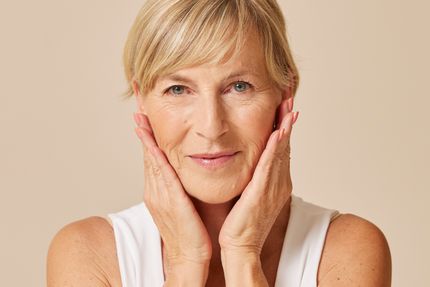

Wies: “The more you know, the easier it becomes.”
When I talked to my GP about struggling with dry eyes, she assured me that this had nothing to do with menopause. My upper and lower eyelids felt like they had been glued together. I was prescribed eye drops and that was that.
Not much later I found out that dry eyes can be related to menopause. The female hormone oestrogen plays an important role in the production of tear fluid. When the production of oestrogen decreases with the onset of perimenopause, this can affect quality and quantity of tear fluid.
Menopause can creep up on you
At first, I was a bit peeved with my GP for missing the signs. Then again, menopause can cause strange and unusual symptoms, so I can't really blame her.
In fact, many women are clueless their symptoms are menopause related. Hence, the importance of educating yourself. We tend to only associate menopause with physical symptoms such as hot flashes, night sweats, mood swings, and heavy and irregular periods. These symptoms are unmistakable signs of menopause.
Psychological effects
Sometimes it’s obvious, and sometimes... well, it’s not. The psychological effects brought on or exacerbated by the menopausal transition can be tricky to recognise, let alone manage.
Honestly, I was an emotional wreck. I was stressed out, anxious and would blow up over the smallest things. Then again, I had a lot on my plate. I had just started my own business and my mother had to go into a nursing home, which took a lot of organising and planning (and the worst thing was, she didn't want to move at all).
I mean, this is enough to stress out even the calmest of people. But I didn’t understand why this was affecting me so much. I had dealt with worse things in my life.
Menopause? Get outta here!
It took a while for the penny to drop. I now know that my psychological symptoms were menopause related. Many of my friends had similar struggles. All women in high positions with burnout complaints. They've always managed to juggle different roles, combine work with caring responsibilities. Then all of a sudden, boom! Everything changes.
That is what your hormones can do to you. Menopause was the last thing on our minds. It can be helpful if you understand that your hormones are playing tricks on you. Rather than doubting yourself, you can start to think of ways to prepare for menopause.
Don’t despair, but prepare
My number one tip is educate yourself. Get your hands on as much information as you can! A gynaecologist once said to me, “Don’t dread menopause, prepare for it instead.” I couldn’t agree more.
Reading tip: Woman on Fire: All about the fabulous menopause by Dr. med. Sheila de Liz.
Who is Wies?
Wies Verbeek (58) is a healthy ageing journalist, founder of website BLOW.nl, and author of ’n Beetje Leuk Ouder Worden, 101 verrassendeenbewezen tips (Ageing Happily, 101 surprising tips that work). And... she’s going through menopause like the rest of us.
Do you need more support?
Alleviate your menopausal symptoms
Each woman's body is different, and when it comes to the menopausal transition, no woman's journey is the same. This means there is no one-size-fits-all solution. Discover how lifestyle, nutrition, supplements and medical treatments can support your health during your menopausal journey.

Possibly of interest to you


FAQ
Are dry eyes a symptom of the menopause?
Dry eyes can be a symptom of the menopause. When the individual hormone levels fall and fluctuate, this can have an effect on eye moisture. The lower the oestrogen level, the less well the mucous membranes and tear fluid can fulfil their task.










